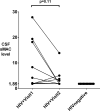Soluble membrane attack complex in the blood and cerebrospinal fluid of HIV-infected individuals, relationship to HIV RNA, and comparison with HIV negatives
- PMID: 28774464
- PMCID: PMC5682931
- DOI: 10.1016/j.jneuroim.2017.07.014
Soluble membrane attack complex in the blood and cerebrospinal fluid of HIV-infected individuals, relationship to HIV RNA, and comparison with HIV negatives
Abstract
The soluble membrane attack complex (sMAC) represents the terminal product of the complement cascade. We enrolled 47 HIV+ adults (12 of whom underwent a second visit at least 24weeks after starting therapy) as well as 11 HIV negative controls. At baseline, cerebrospinal fluid (CSF) sMAC was detectable in 27.7% of HIV+ individuals. CSF sMAC correlated with CSF HIV RNA levels and was more likely to be detectable in HIV+ individuals on cART compared to HIV negative controls. In HIV+ participants, there were negative association trends between sMAC and neurocognitive performance but these did not reach statistical significance.
Keywords: Acquired immunodeficiency syndrome; Complement; Human immunodeficiency virus; Membrane attack complex; Neurocognitive disorder.
Copyright © 2017 Elsevier B.V. All rights reserved.
Conflict of interest statement
Theresa N. Schein, CEO / Co-Founder CNine Biosolutions, LLC.
Scott R. Barnum, CSO / Co-Founder CNine Biosolutions, LLC
Figures
References
-
- Bejamini YH, Y Controlling the false discovery rate: a practical and powerful approach to multiple testing. Journal of the Royal Statistical Society, Series B (Methodological) 1995;57:289–300.
-
- Blennow K, Fredman P, Wallin A, Gottfries CG, Karlsson I, Langstrom G, et al. Protein analysis in cerebrospinal fluid. II. Reference values derived from healthy individuals 18–88 years of age. Eur Neurol. 1993;33:129–33. - PubMed
-
- Brenchley JM, Price DA, Schacker TW, Asher TE, Silvestri G, Rao S, et al. Microbial translocation is a cause of systemic immune activation in chronic HIV infection. Nature medicine. 2006;12:1365–71. - PubMed
Publication types
MeSH terms
Substances
Grants and funding
LinkOut - more resources
Full Text Sources
Other Literature Sources
Medical




